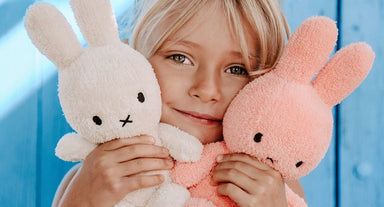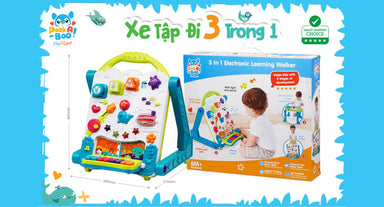SLEEP CARE FOR NEWBORN INFANT

You just need to put your baby down and he or she will fall asleep right away. It sounds very simple, but when you become a parent, getting your baby back to sleep is quite complicated. There are many things that need to be done in a routine and kept on schedule. Perhaps you will be very worried if your baby sleeps too much when he is born or when he is a toddler he doesn't like to sleep. You will feel like you are fighting a battle that you know you will lose.
So how to train your baby to sleep on his own? The article below will share a few essential tips, ways to organize time, relaxation methods and great devices to help you solve your baby's daytime sleep problems.
Newborns: How long do babies need to sleep?
If you can't differentiate between day sleep and night sleep, your baby will sleep a lot. In fact, newborns can sleep up to 17 hours a day, and each nap lasts about 20 minutes to 3 hours . This is completely normal and also very important (it affects the baby's development). So, just let your baby sleep. Except for the crib, babies can sleep in another warm and safe space, which is the Bassinet . This is a perfect portable bed for babies (you can put it next to you)
Two-month-old baby: Need to train your baby to sleep on his own during the day
When entering the period of 8-12 months of age, your baby will wake up a lot during the day and sleep a lot at night. This is an ideal opportunity for you to train your baby to sleep on his own during the day.
• Draw the curtains
• Read a book
• Talk to your baby in a quiet, gentle voice
• Soothe your baby to sleep with light or soothing music
Training your baby to sleep on his own during the day is like sleeping at night but for a shorter period of time.

Don't miss your baby's Sleep Window
If you don't put your baby down in time to let him sleep, he will have to try to fight sleepiness. This makes your baby even more tired. At the same time, at that time you missed your baby's Sleep Window - this is the sensitive time before your baby starts to sleep.
Here are signs to know your baby is sleepy:
• Baby is irritable
• There is redness around the baby's eyes, the baby is frowning or the cheeks are pink
• Baby doesn't concentrate or stares into the air
• Baby moves arms and legs, body tenses
• Baby is fussy and crying
You need to pay attention to the above signs to be able to effectively train your baby to sleep on his own. Because if you miss your baby's sleepiness point, it will be very difficult for him or her to fall asleep, or even lose sleep. At that time, your child will feel very tired, and not happy.
Newborns: You should start training your baby to sleep on his own on time
When your baby is about 3 months old, he or she will transition from a newborn sleep cycle to a toddler sleep cycle. Now you will easily recognize when your baby wants to sleep. Instead of letting your baby sleep 3-6 times a day, you can train your baby to sleep 3-4 times on his own. When your baby starts to grow up, you can reduce from 2-3 naps a day (from 6-9 months old) to one nap a day (from 12-18 months old).
However, one thing needs to be emphasized: you must train your baby to sleep on his own on time. Missing a nap can cause your baby to miss out on a whole day of fun. So whether you're going to a relative's house, going on a picnic or taking a walk in the garden, you should follow your baby's sleep schedule by bringing a portable crib with canopy for your baby. little .

How many naps should you train your child to sleep on their own and for how long?
Below is a chart to assess your baby's sleep:
• Period from 4-6 months: 3 naps, lasting about 3-4 hours
• Period from 6-12 months: 1-2 naps, lasting about 2-3 hours
If your baby's sleep changes to short naps (20-30 minutes), then you can skip the third (or second, if your baby is older) nap.
When you want to reduce 3 naps a day to 2 naps a day, you need to make careful arrangements. When your child is ready to reduce sleep, each day you can practice getting him to sleep on his own by moving the first and second naps a few minutes later than scheduled, until he gets used to sleeping twice. Sleep.
In the morning, after your baby wakes up, eats, drinks and plays, he or she can start sleeping for the first time. After lunch, the baby continues to take a second nap to regain energy for playing, eating, bathing and listening to stories in the evening.
Toddlers: Train your baby to fall asleep on their own in a completely new sleep cycle
As your baby gets older, he or she sleeps less and less during the day. At the toddler stage, your baby will sleep more in the afternoon. This helps your baby gain more energy and also allows you to rest more.
You need to train your baby to sleep properly during the day. Every day, you can try moving your baby's first nap a few minutes later until he feels sleepy around 11:30 a.m. or after lunch. Of course, at this time you need to put your baby to sleep in a child's bed, and getting your baby to sleep is also a difficult task. This is when the baby sleep device comes into play . Gentle melodies and gentle light modes will help your baby transition from an alert state to a resting state and help them relax comfortably.

Preschoolers: The end of daytime sleep
If your baby has missed daytime sleep but he or she doesn't feel tired, it means he or she is ready to stop sleeping during the day. During preschool age, babies may not sleep during the day but still receive many benefits from quiet time.
Your baby can rest and read a book, or relax by watching a favorite show . Rest time will help children gain more energy to be active in the afternoon. Even though your baby doesn't feel sleepy, you should still quietly observe him.

A comfortable sleep!
Training your baby to nap independently from an early age will help babies under 1 year old and older children easily transition to a new schedule. A short nap or proper rest will help babies easily do the most important thing in a day - sleeping at night !




